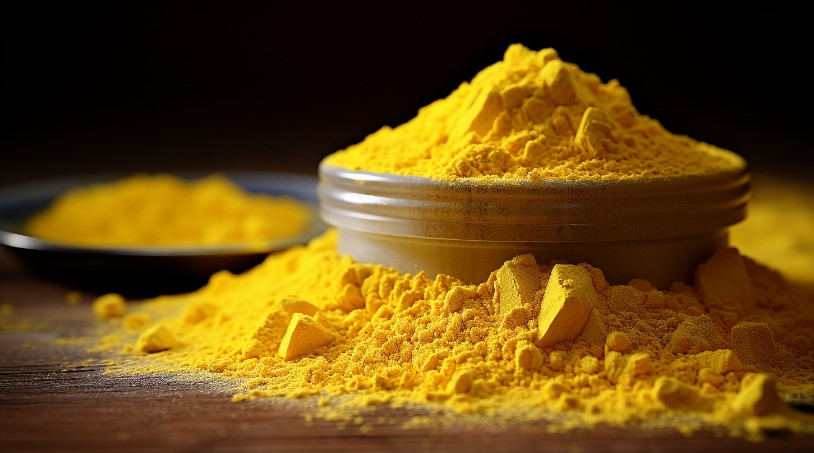Berberin 80-97%

Berberin also known as berberine, a common isoquinoline alkaloid, molecular formula C20H18NO4. It is found in many plants of four families and ten genera such as Berberis. It was first obtained in 1826 by M. E. Chevalier and G. Peltan from the bark of Xanthoxylonclava. Berberine is a quaternary ammonium alkaloid. Yellow acicular crystals can be precipitated from the ether. Melting point 145°C; Soluble in water, insoluble in benzene, ether and chloroform. The solubility of its salts in water is relatively small, such as 1∶500 for hydrochloride and 1:30 for sulfate.
Another name:berberine
character:Yellow powder
source:It is extracted from a variety of plants (such as Coptis, Phellodendri, three needles, etc.)
CAS number:2086-83-1
Molecular formula:C20H18NO4
Molecular weight:336.36
Berberin has antibacterial effect on hemolytic streptococcus, Staphylococcus aureus, gonococci, Fredricki and Shigella dysenteriae, and can enhance white blood cell phagocytosis, inhibit tuberculosis bacillus and yersinia pestis to varying degrees, and inhibit amoeba in rats. Berberine has anticurary effects in animals, and has peripheral antihypertensive and antipyretic effects. Berberine hydrochloride (commonly known as berberine hydrochloride) has been widely used in the treatment of gastroenteritis, bacillary dysentery, tuberculosis, scarlet fever, acute tonsillitis and respiratory infection also has a certain effect. In traditional Chinese medicine, Coptis, Phellodendri, three needles and ten virtues are commonly used as heat-clearing and detoxification drugs, among which berberine is the main active ingredient.
Berberin Pharmakologische Wirkung
The antibacterial spectrum is wide, and it has antibacterial effect on many kinds of gram-positive and gram-negative bacteria in vitro, including hemolytic streptococcus, Staphylococcus aureus and Vibrio cholerae. Meningococcus, Shigella dysentery, typhoid bacillus, diphtheria bacillus have strong inhibitory effect, low concentration of bacteriostasis, high concentration of bactericidal. It also has certain inhibitory effect on influenza virus, amoeba, leptospira and some skin fungi. In vitro experiments show that berberine can enhance the phagocytosis of leukocyte and hepatic reticuloendothelial system. Dysentery bacillus, hemolytic streptococcus, staphylococcus aureus and so on are easy to develop resistance to this product. There is no cross-resistance between this product and penicillin, streptomycin, etc.
Berberin pharmacokinetics
Poor oral absorption. After injection, the drug quickly enters the organs and tissues, and the blood concentration is maintained for a short time. The blood concentration after intramuscular injection was lower than the minimum inhibitory concentration. Drugs are widely distributed, mainly in the heart, bone, lung and liver. The retention time in the tissue is short, only a trace amount remains after 24 hours, most of the drugs are metabolized and cleared in the body, and the discharge in its original form within 48 hours only accounts for less than 5% of the dose. Recently, it has been reported that this product can reduce the number of pili on the surface of the body, so that the bacteria can not attach to the human cells, and play a therapeutic role. This product also has an effect on Helicobacter, and can relieve gastritis, gastric and duodenal ulcer.
Berberine hydrochloride tablets, compound Muxiang Berberine tablets, Shangqing pills, golden paste, Coptis Qingxin tablets, Qinggan granules, Coptis Shangqing tablets, compound matrine lotion, Xianglian capsules, Xianglian pills, Baidai pills, Yiqing granules, compound berberine tablets, Qihuang granules, Xiaokejiangtang pills, etc。
Berberine supplier: www.backvita.com
E-Mail: [email protected]
Telefon: +86 (029) 8187 2325
